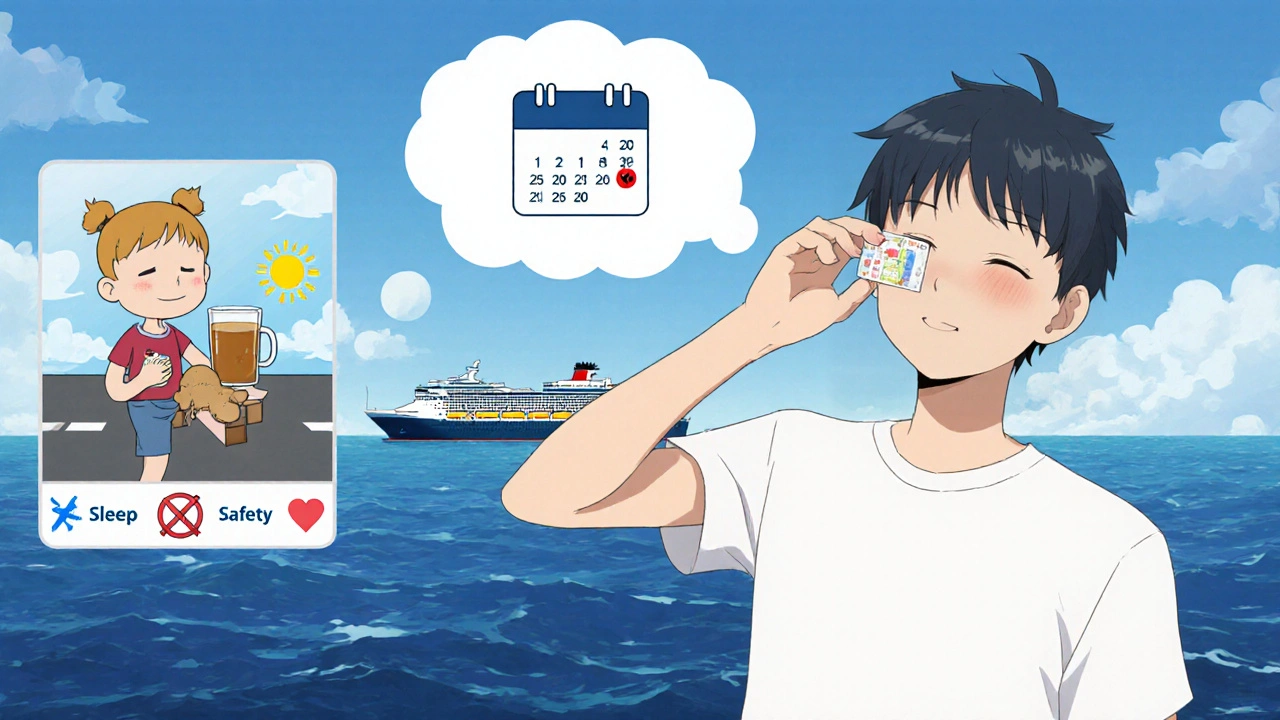Motion Sickness Remedy Selector
Select Your Travel Profile
Traveling by road, sea, or air can turn a fun adventure into a queasy nightmare. Everyone’s tried that spinning feeling, and most of us have reached for something to stop the nausea. But which product actually works best for you? Below we break down Dramamine, its main competitor drugs, and even a few natural options, so you can pick the right remedy without guessing.
Quick Takeaways
- Dramamine (dimenehydrinate) is an antihistamine that blocks the brain signals that cause motion‑sickness nausea.
- Meclizine and cyclizine offer longer‑lasting relief with less drowsiness for many people.
- Scopolamine patches work through the skin and are ideal for longer trips, but they can cause dry mouth and blurred vision.
- Ginger, a natural root, reduces nausea for mild cases and has virtually no side effects.
- Diphenhydramine (Benadryl) is a strong antihistamine that works well but often makes you feel very sleepy.
What is Dramamine (Dimenhydrinate)?
Dramamine is a first‑generation antihistamine whose active ingredient is dimenhydrinate. It’s been on pharmacy shelves since the 1940s and is marketed specifically for motion‑sickness prevention. The tablet usually comes in 50 mg doses, and adults are advised to take one 30-60 minutes before travel.
How Does Dimenhydrinate Work?
Dimenhydrinate blocks histamine H1 receptors in the brain’s vestibular system - the part that senses motion. By dampening these signals, it reduces the mismatch between what the eyes see and what the inner ear feels, which is the main trigger for motion‑induced nausea. The trade‑off is that the same blockage can cause drowsiness, a side effect many users notice.
Common Alternatives to Consider
Below are the most widely used alternatives, each with its own pros and cons.
Meclizine is a second‑generation antihistamine that also blocks H1 receptors but crosses the blood‑brain barrier less, so it’s generally less sedating. It’s sold under brand names like Antivert and Bonine.
Cyclizine works similarly to meclizine, offering 24‑hour relief with moderate drowsiness. It’s common in Europe and often combined with caffeine in over‑the‑counter products.
Scopolamine is an anticholinergic administered as a transdermal patch (often called Transderm‑Scop). It bypasses the gut, making it ideal for long trips or when pills cause stomach upset.
Ginger (Zingiber officinale) is a plant root used for centuries as a natural anti‑nausea agent. Fresh, powdered, or candied ginger can be taken before travel, and research shows it cuts nausea intensity by about 30 % on average.
Diphenhydramine, sold as Benadryl, is another first‑generation antihistamine. It’s very effective but typically causes stronger sedation than dimenhydrinate.
Side‑By‑Side Comparison
| Medication | Active Ingredient | Onset | Duration | Typical Dose (AU$) | Common Side Effects | Best For |
|---|---|---|---|---|---|---|
| Dramamine | Dimenhydrinate | 30‑60 min | 4‑6 hrs | 50 mg tablet ≈ $5 | Drowsiness, dry mouth | Short trips, budget‑friendly |
| Meclizine | Meclizine hydrochloride | 1‑2 hrs | 24 hrs | 25 mg tablet ≈ $8 | Mild drowsiness, headache | Longer journeys, need less sleepiness |
| Cyclizine | Cyclizine hydrochloride | 30‑45 min | 12‑24 hrs | 50 mg tablet ≈ $7 | Drowsiness, dry eyes | European travelers, moderate duration |
| Scopolamine Patch | Scopolamine hydrobromide | 4‑6 hrs (steady state) | Up to 72 hrs | 1 patch ≈ $30 | Dry mouth, blurred vision | Multi‑day cruises, road trips |
| Ginger | Zingiber officinale root | 10‑20 min | 2‑3 hrs | 2 g fresh ≈ $2 | Heartburn (rare) | Mild nausea, natural‑prefers |
| Diphenhydramine (Benadryl) | Diphenhydramine hydrochloride | 15‑30 min | 4‑6 hrs | 25 mg tablet ≈ $4 | Heavy sedation, urinary retention | Severe nausea, when sleep isn’t a problem |
How to Choose the Right Option
Think about three practical factors before you reach for the medicine cabinet:
- Trip length. For a 2‑hour drive, a single dramamine tablet is cheap and easy. For a week‑long cruise, a scopolamine patch avoids repeated dosing.
- Tolerance for drowsiness. If you need to stay alert (driving, operating machinery), meclizine or cyclizine usually keep you more awake than dramamine or benadryl.
- Health considerations. People with glaucoma, prostate enlargement, or certain heart conditions should avoid anticholinergics like scopolamine and diphenhydramine.
Another tip: start with the lowest effective dose. Many users find that half a dramamine tablet (25 mg) already tames the queasiness without making them feel foggy.

Safety, Interactions, and Who Should Avoid
All antihistamines share a few red flags. Never mix them with alcohol - the sedative effect can become dangerous. Dimenhydrinate can also interact with certain antidepressants (SSRIs) and anticonvulsants, amplifying dizziness.
Pregnant or breastfeeding people should talk to a doctor before using any over‑the‑counter motion‑sickness drug. Ginger is generally regarded as safe during pregnancy, making it a go‑to for expectant mothers experiencing mild nausea.
Practical Tips for Maximum Effect
- Take the medication **before** you feel sick. Once nausea starts, the drug works slower.
- Stay hydrated, but avoid heavy meals right before travel. A light snack (crackers, fruit) helps absorption.
- If you’re using a scopolamine patch, apply it behind the ear at least 4 hours before boarding. Remove it 6 hours after you disembark.
- Store all meds in a cool, dry place. Dimenhydrinate loses potency if exposed to high heat, which can be a problem in a hot car.
Frequently Asked Questions
Can I take Dramamine and meclizine together?
It’s not recommended. Both block the same histamine receptors, so combining them increases sedation without adding extra protection.
How long does a scopolamine patch protect me?
One patch releases medication steadily for up to 72 hours, covering most long trips or cruises.
Is ginger effective for severe motion sickness?
Ginger works best for mild to moderate nausea. For severe cases, an antihistamine like dimenhydrinate or meclizine is usually needed.
Can children use Dramamine?
Yes, but at reduced doses: 25 mg for kids 2‑12 years old. Always check the label or ask a pharmacist.
What should I do if I feel too drowsy after taking an antihistamine?
Sit down, stay hydrated, and avoid driving. The drowsiness usually fades in a few hours; if it persists, contact a healthcare professional.
Bottom line: there’s no one‑size‑fits‑all motion‑sickness pill. By understanding how each option works, you can match the medicine to your travel style, health needs, and tolerance for side effects. Happy, nausea‑free journeys!


Sarah Riley
October 22, 2025 AT 18:19Dimenhydrinate’s antihistaminic profile is pharmacologically suboptimal for prolonged voyages.
Wade Grindle
October 30, 2025 AT 05:53Travelers often gravitate toward Dramamine because it’s cheap and widely available. However, its onset time of 30‑60 minutes can be a drawback on spontaneous trips. For longer journeys, meclizine’s 24‑hour coverage generally outperforms it. Consider your itinerary before reaching for the first‑generation antihistamine.
Jai Reed
November 6, 2025 AT 18:26When selecting a motion‑sickness remedy you must first assess the duration of your travel. Short trips lasting under four hours are adequately covered by a single 50 mg Dramamine tablet. For journeys extending beyond a day, meclizine provides up to twenty‑four hours of protection with markedly less sedation. Cyclizine offers a comparable window of effect, but it may still induce noticeable drowsiness in some users. Scopolamine patches release medication continuously for up to seventy‑two hours, making them ideal for cruises or multi‑day road trips. The trade‑off for this convenience is dry mouth and occasional blurred vision. Ginger, while completely natural, only reduces mild nausea and lacks the potency required for severe cases. Diphenhydramine delivers rapid onset within fifteen minutes, but the heavy sedation it causes can impair driving and operating machinery. Combining any two antihistamines, such as Dramamine with meclizine, is unnecessary and dangerously increases central nervous system depression. Patients with glaucoma, enlarged prostate, or cardiac arrhythmias should avoid anticholinergic agents like scopolamine and diphenhydramine. Alcohol consumption with any antihistamine dramatically amplifies sedative effects and must be avoided. If you experience excessive drowsiness after taking a medication, discontinue use and stay seated until the effects subside. Always consult a healthcare professional before giving these drugs to children or pregnant individuals. In summary, match the drug’s onset, duration, and side‑effect profile to your specific travel scenario for optimal results.
Joanne Ponnappa
November 14, 2025 AT 07:00Got a quick tip: chew on a small piece of fresh ginger before you board - it’s gentle, inexpensive, and won’t make you sleepy 😊
Suryadevan Vasu
November 21, 2025 AT 19:33While you note cost, remember that meclizine’s reduced sedation can also translate to higher productivity on work trips.
Sajeev Menon
November 29, 2025 AT 08:06i think the long sentences are great but maybe a bit too much for a quick read, still good info!
WILLIS jotrin
December 6, 2025 AT 20:40From personal experience, I found that taking the medication with a light snack, like crackers, helps absorption and lessens stomach upset. Timing it about an hour before departure seems to hit the sweet spot.
Michael Vandiver
December 14, 2025 AT 09:13Totally agree! I always pop a tablet with some pretzels before a roadtrip 🚗💨 it really works for me
Rachael Turner
December 21, 2025 AT 21:46Motion sickness can be a real buzzkill especially on long flights the vestibular mismatch triggers nausea and vomiting but a proper pre‑emptive dose of an antihistamine can save the day also staying hydrated and focusing on the horizon helps the brain calibrate the sensory inputs
Vin Alls
December 29, 2025 AT 10:20The battlefield of motion‑sickness remedies is a kaleidoscope of pharmacology and nature-Dramamine marches in with brute force, meclizine glides in sleek and subtle, while ginger pirouettes lightly, whispering calm to an unsettled stomach.
Tiffany Davis
January 5, 2026 AT 22:53I appreciate the vivid description however a more straightforward comparison would aid readers seeking practical guidance.
Diane Thurman
January 13, 2026 AT 11:26Honestly this article is kinda waffling around the real issue – most people dont read the fine print on dosage and end up feeling drowsy for no reason.
Iris Joy
January 21, 2026 AT 00:00Great roundup! Remember, the best approach is to start low, test how your body reacts, and adjust accordingly for a smoother journey.